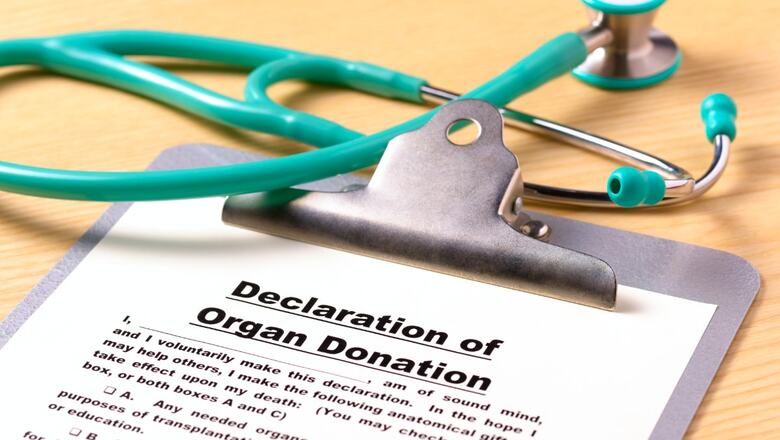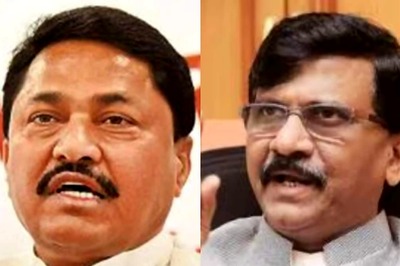
views
India recorded the highest number of organ donations in 2023, crossing the mark of 1,000 organs from deceased donors. Though organ donation rates in the country are alarmingly low, there is a glimmer of hope in the upward trajectory.
In India, donations from deceased donors have remained extremely low hovering at 351, 552 and 941 in the last three years. Although the official release of 2023 data is pending, sources in the health ministry told News18 that, for the first time, the figure of 1,000 deceased donations has been surpassed.
Presently, India grapples with a dire shortage of organ donations, particularly deceased donations, as evidenced by a staggering waiting list of over 3 lakh patients and a tragic toll of at least 20 deaths daily. According to the health ministry’s data, the total number of donors, including deceased donors, saw an increase from 6,916 in 2014 to approximately 16,000 by 2022.
In 2022, out of 16,000 donations, nearly 80% were from living donors, which is not ideal. The majority of transplants should come from deceased donors.
However, doctors perceive a noticeable shift and the numbers suggest a significant change as well. Medical experts have noticed an increasing trend in organ donation following counselling, especially in leading hospitals with tertiary-level care and advanced ICUs.
These institutions often follow protocols to conduct brain death testing for patients perceived to be clinically brain dead. Here, coordinators and grief counsellors counsel the families about the possibility of organ donation before withdrawing life support.
Doctors believe that this engagement from experts, along with the support of transplant coordinators and grief counsellors, contributes to an increase in organ donation at the hospital level along with other factors, including the efforts and promotion by government and NGOs.
Top States and Pledging Trends
As per the data of NGO Organ India, the pledges in financial year 2013-14 stood at just 215, but jumped to over 27,000 in 2015-16. Pledges then fell to 23,000 during the Covid-19 outbreak in 2020-21. During the financial year 2022-23, the NGO registered 16,896 pledges, again registering a downfall.
According to government data from the National Organ and Tissue Transplantation Organization (NOTTO), India registered more than 1.38 lakh pledges starting from September 2, 2023, till 28 January, 2024.
While the data by NOTTO includes data from all sources, including NGOs, individuals and other institutions, the data is available only till September 2022.
In the last five months, the top five states pledging organs are Rajasthan (34,516), Maharashtra (25,058), Madhya Pradesh (20,361), Karnataka (19,105) and Telangana (11,834).
The majority of these pledges have been made in the age group of 30-45 years with more than 60% pledges by women. Maximum pledges have been made to donate organs and tissues. In pledges for organs, over 98,000 pledges have been made to donate kidneys followed by heart (93,000), liver (93,000), lungs (85,000) and pancreas (80,000).
Under the total number of tissue pledge registrations, cornea (both eyes) pledges exceeded over a lakh registrations followed by bones, heart valves and skin at around 72,000 each.
Donating Organ Impacts Over 25 Lives: Doctors
In ICUs, families of individuals declared brain dead due to accidents or strokes are offered the opportunity for organ donation, providing hope for life-saving transplantation amid tragedy.
According to medical experts, this altruistic decision holds the potential to save “up to nine lives” as organs from a brain-dead donor can be transplanted into those in need.
“Organ donation not only saves lives through transplantation but also has the power to positively impact another 25 lives through tissue donation,” said Dr Arvinder Singh Soin, chairman, Institute of Liver Transplantation and Regenerative Medicine, Medanta, Gurugram.
Doctors have been noticing changes in the mindset. “Awareness about this concept is gradually growing in society, with higher levels in South and West India,” Soin said.
Many others like Soin have observed a growing trend in organ donation post-counselling, particularly in major hospitals with tertiary-level care and advanced ICUs.
Dr Ayan Kar, consultant and interventional cardiologist at NH Rabindranath Tagore International Institute Of Cardiac Sciences, Kolkata has noticed “a sea change” in how organ donation numbers have gone up in the past few years specifically in the eastern region of the country where heart transplants, which are dependent on cadaveric transplants or from those who are dead donors, were zero, five years ago.
In the last five years, Kar said: “In Kolkata, we have had approximately 24 cardiac transplants. This number was zero, five years ago.”
“This is largely due to government-backed campaigns through unbiased NGOs and grief counsellors and media reports on how one person can contribute multiple organs and save not one but multiple lives,” he said.
Kar said that more awareness has resulted in patients, attendees and the common public asking about methods to sign up for organ donation.
Despite Increase, Donation Rates Are Extremely Low
While organ donation rates are increasing, India still has a considerable distance to cover. In comparison, the US witnesses 40 donations per million, and Spain surpasses 50 donations per million, indicating the potential for growth in India’s organ donation landscape.
India currently records only 0.86 donations per million population, reflecting a substantial gap. However, this figure marks progress compared to a decade ago when it stood at 0.1.
In stark contrast lies the demand for human organ donation, with an annual need of approximately 5 lakh organs. Merely 2-3% of this demand is fulfilled, resulting in numerous deaths due to organ failure every year across India.
While there is evident progress, the pace of this movement is gradual and requires acceleration. Experts believe that improved awareness programs on organ donation at various levels, including government initiatives, non-governmental efforts, and within hospitals, are crucial to hasten this positive shift in societal perspectives.
Dr Sudeep Singh Sachdev, director and senior consultant, Nephrology and Renal Transplantation at Narayana Hospital Gurugram blames deep-seated societal reservations and superstitions posing formidable barriers, hindering progress and making it challenging to convince families of the deceased to embrace organ donation.
He believes that there is an urgent need to dispel myths surrounding brain death as it leads to the loss of around 2 lakh kidneys and vital organs each year.
“Harvesting 5–10% of potential organ donations from brain-dead individuals could render the need for living donors obsolete,” Sachdev said.
He said that while there has been commendable progress, including a 27% annual increase in transplant numbers, the demand for organs far exceeds the available supply.
Definite Winds of Change But No Big Change in Numbers
Sunayna Singh, CEO of Organ India, recalls the time when she started working in 2013. It was the time when they arranged awareness sessions on organ donations and no one would come to the gatherings as they were “petrified of what it meant”.
“They probably thought we would want them to donate their organs at that point,” Singh said.
She recalled that it was very difficult to get corporations, schools, colleges etc to agree to talks and seminars on organ donation. Ten years on things are very different, she said.
“Now there is a huge interest in organ donation and people contact us for campaigns, talks, and awareness activities and there has been a massive shift in attitudes. Organ donation was earlier virtually unheard of and for some, it was associated with negative connotations.”
Experts claimed that due to extensive awareness initiatives led by various NGOs and governments, organ donation is now perceived as a life-saving concept, prompting widespread support for large-scale campaigns.
“We had a huge collaboration with MTV and with a big masala brand ‘JK Masale’ in eastern India,” Singh said.
“Now, corporates are willing to undertake mass awareness. While earlier schools were a bit apprehensive, now multiple schools have students who are undertaking projects on organ donation and carrying on the work beyond just talks and seminars through various initiatives. Across the country, the trend is the same.”
Hiccups in Organ Donation
There are several challenges associated with organ donation after brain death. Medical experts told News18 that not all hospitals with ICUs – even if legally allowed – have the necessary protocols, systems, and equipped staff for organ retrieval.
Secondly, in remote areas with lower literacy and awareness rates, there persists a misconception that certain religions forbid organ donation.
“The other challenge involves families who, having spent significant amounts on treatment in neuro ICUs, may feel upset and resistant to considering organ donation amid their grief,” Soin from Medanta explained.
“Sensitivity and effective communication are key during these emotional times to address concerns and facilitate informed decisions about organ donation,” he said.
He explained that there are significant hurdles associated with organ donation, including “misconceptions about the commercial aspects of the process”.
Highlighting a crucial aspect, he said that some families may perceive hospitals as prioritising financial gain, thinking that by saving organs for transplants, hospitals are seeking to generate more revenue.
“However, it’s crucial to educate the public that the primary motivation behind organ donation is to save the lives of patients facing organ failure, not financial gain.”

















Comments
0 comment